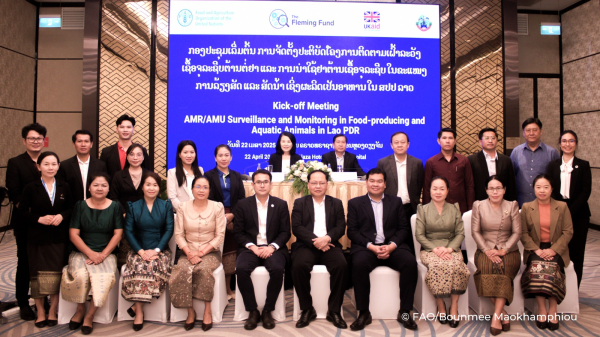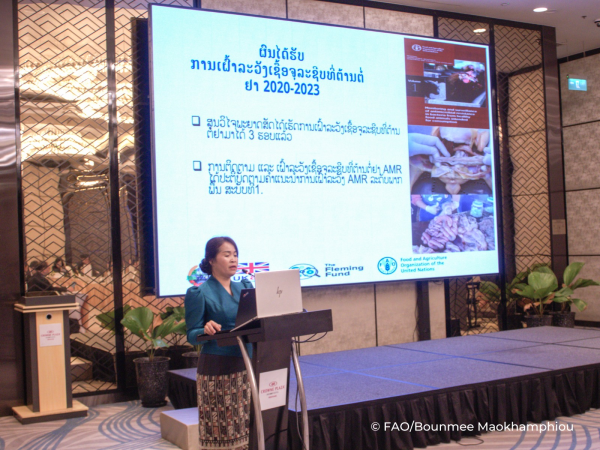KPL
The Department of Livestock and Fisheries (DLF), the Ministry of Agriculture and Forestry, in collaboration with the Emergency Center for Transboundary Animal Diseases (ECTAD) of the Food and Agriculture Organization of the United Nations (FAO), officially launched a national initiative to monitor and surveil antimicrobial resistance (AMR) and antimicrobial use (AMU) in food-producing and aquatic animals in the Lao PDR.

(KPL) The Department of Livestock and Fisheries (DLF), the Ministry of Agriculture and Forestry, in collaboration with the Emergency Center for Transboundary Animal Diseases (ECTAD) of the Food and Agriculture Organization of the United Nations (FAO), officially launched a national initiative to monitor and surveil antimicrobial resistance (AMR) and antimicrobial use (AMU) in food-producing and aquatic animals in the Lao PDR.
This initiative is part of the FAO-Fleming Fund Country Grant Phase 2, generously funded by the United Kingdom Agency for International Development (UK Aid) through the Department of Health and Social Care (DHSC)'s Fleming Fund. It aims to improve data collection and analysis on AMR/AMU to inform national policies and combat the growing global health threat of antimicrobial resistance.
Antimicrobial resistance occurs when bacteria, viruses, fungi, and parasites evolve to resist treatment from existing medications such as antibiotics, antifungals, and antivirals. In 2021 alone, an estimated 4.71 million deaths were associated with bacterial AMR, highlighting its devastating impact. Projections warn of up to 10 million annual deaths and $100 trillion in economic losses by 2050 if no action is taken.
Deputy Director General of the DLF Souphavanh Keovilay emphasized that AMR is largely driven by the overuse and misuse of antimicrobials in human health and animal production systems. He stressed the importance of reliable data, stating, “Data is power. It helps us understand the spread of AMR, tailor treatments more effectively, and shape national policy.”

The inception workshop for the initiative brought together technical experts and stakeholders from across the country to develop practical, evidence-based surveillance plans. Key targets include: Surveillance of AMR/AMU in healthy live broiler chickens at farm level in Vientiane Capital, Louangprabang, and Champasak Province, monitoring in pilot aquaculture sites in Vientiane Capital, expansion to aquaculture sites in Louangprabang, Savannakhet, and Champasak Provinces during 2025.
Ms. Kim Kyung-Mee, FAO Representative to the Lao PDR, highlighted the valuable contributions from UK Aid and reaffirmed FAO’s commitment to working with the Lao government. “This initiative builds on the strong foundation laid during Phase 1 of the FAO-Fleming Fund project, started in 2019. Continued collaboration will help protect public health, food systems, and the environment,” she stated.
The workshop gathered representatives from key national institutions including the National Animal Health Laboratory, Veterinary Services, Aquaculture Laboratory, and academia, alongside provincial authorities, private sector actors like CP Laos Ltd., and international development partners.
This national AMR/AMU surveillance marks a significant step forward in strengthening the Lao PDR’s ability to detect and respond to antimicrobial threats in both animal and aquaculture sectors, contributing to regional and global health security.
KPL